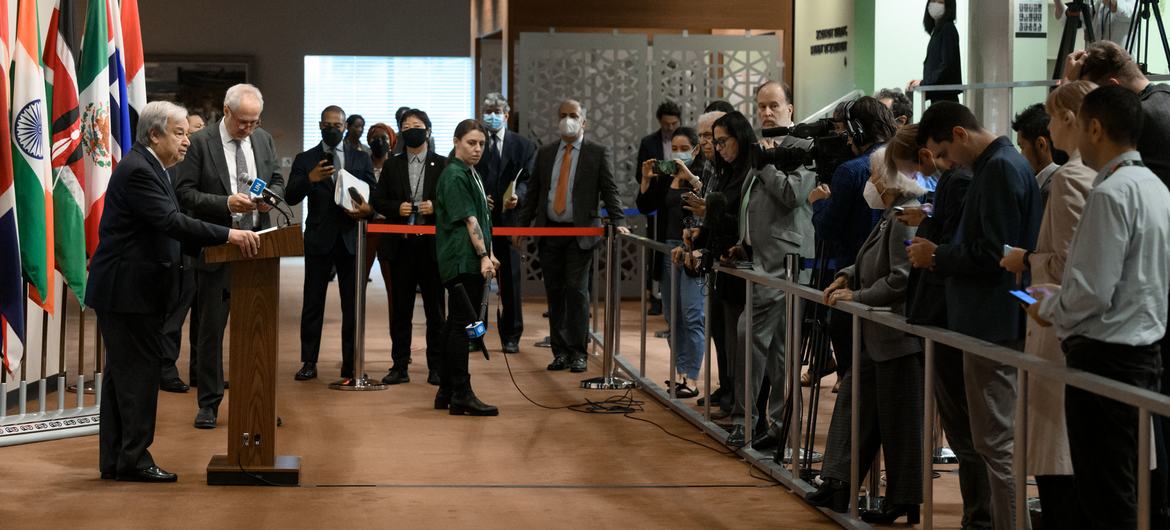
UNITED NATIONS, Nov 4 (NNN-Xinhua) — UN Secretary-General Antonio Guterres called for the renewal of the Ukraine grain deal, and for the application of the same spirit of multilateralism at the upcoming UN Climate Change Conference in Egypt, or COP27.
At a press encounter, Guterres called for the renewal of the Black Sea Grain Initiative as Russia has agreed to resume its participation.
“Now that the initiative has fully resumed, I appeal to all parties to concentrate efforts in two areas: first, to renewal and full implementation of the Black Sea Initiative; second, to removing the remaining obstacles to the exports of Russian food and fertilizer,” said Guterres.
“I am fully committed — along with the entire United Nations system — to the achievement of both these essential objectives,” he said.
The initial duration of the Black Sea Grain Initiative, which allows the export of Ukrainian grain and other agricultural products from Black Sea ports, is 120 days and expires on Nov 19. The parties had agreed that the deal could be extended automatically on the condition that no party objects.
The Russian announcement on Saturday of the suspension of its participation in the deal had dampened hopes for its renewal.
Russia announced on Wednesday that it will resume its participation, after days of diplomatic engagement. Guterres had to alter his travel plan to focus on this issue.
The world needs safe and unimpeded navigation for exports of grain, foodstuffs and fertilizer from Ukraine through the Black Sea, and the world needs concerted efforts to urgently address the global fertilizer market crunch and make full use of Russian export capacity, said Guterres.
“Higher fertilizer prices are already affecting farmers around the world. We cannot allow global fertilizer accessibility problems to morph into a global food shortage,” he said.
Over the past few days, the world has come to understand and appreciate the importance of the Black Sea Grain Initiative — for stemming the food crisis, for easing prices and pressures on people around the world, for reducing the risks of hunger, poverty and instability, said Guterres, referring to Russia’s suspension of its participation in the initiative.
“The Black Sea Grain Initiative is making a difference … As of today, 10 million metric tons of grain and other foodstuffs have been shipped through the Black Sea corridor. It has taken just three months to reach this milestone,” he said.
Despite all the obstacles, “the beacon of hope in the Black Sea is still shining,” he said.
Guterres also hailed the signing of an agreement on cessation of hostilities between the federal government of Ethiopia and the Tigrayan People’s Liberation Front.
“It is a critical first step that paves the way for the unimpeded delivery of life-saving humanitarian aid and the resumption of public services. The human cost of this conflict has been devastating,” he said. “I urge all Ethiopians to seize this opportunity for peace and I pledge the full support of the United Nations.”
The rescue of the Black Sea Initiative and the signing of the Ethiopian peace agreement demonstrate the power of multilateralism in action and the value of discrete but determined diplomacy, said Guterres.
“We must never give up in the cause of peace and advancing the values of the United Nations. That is the spirit that every country must bring to the UN Climate Conference, COP27, in Sharm el-Sheikh, Egypt,” he said.
COP27 must be the place to rebuild trust and re-establish the ambition needed to avoid driving our planet over the climate cliff, he said.
In the last few weeks, report after report has painted a clear and bleak picture: emissions are still growing at record levels. Instead of going down 45 percent by 2030, greenhouse gas emissions are on course to rise by 10 percent. Meanwhile, temperatures are on course to rise by as much as 2.8 degrees — with the present policies in place — by the end of the century, said Guterres.
“And that means our planet is on course for reaching tipping points that will make climate chaos irreversible and forever bake in catastrophic temperature rise. We need to move from tipping points to turning points for hope,” he said.
That means urgently increasing ambition and trust, especially between North and South. Specifically, it is time for a historic pact between the developed and emerging economies — a pact in which developed countries deliver on the commitment made in Paris and make additional efforts to reduce emissions in line with the 1.5-degree goal, and a pact in which wealthier countries provide financial and technical assistance — along with support from multilateral development banks and technology companies — to help emerging economies speed their renewable energy transition, said Guterres.
“COP27 must be the place to close the ambition gap, the credibility gap and the solidarity gap. It must put us back on track to cutting emissions, boosting climate resilience and adaptation, keeping the promise on climate finance and addressing loss and damage from climate change,” he said.
“Getting concrete results on loss and damage is the litmus test of the commitment of governments to help close all these gaps … There is no way anyone can argue there is no loss and no damage. The world must come together to support developing countries and vulnerable communities,” he said.
COP27 must lay the foundations for much faster, bolder climate action now and in this crucial decade, when the global climate fight will be won or lost. All nations and all people must be on board in these make-or-break next years, starting at COP27, he said. — NNN-XINHUA





